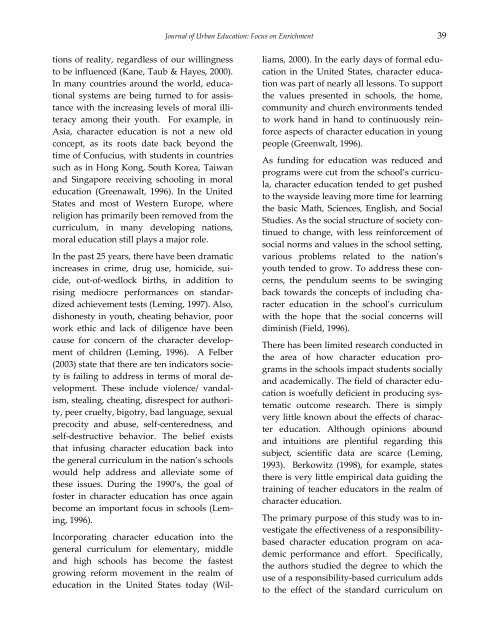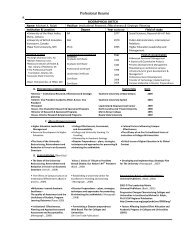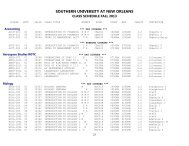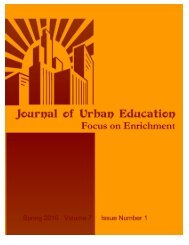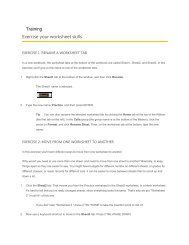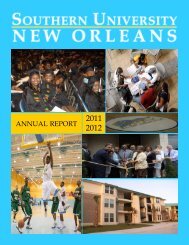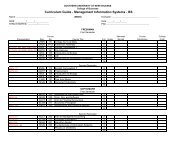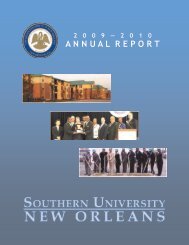THE EFFECTS OF A RESPONSIBILITY-BASEDCHARACTER EDUCATION PROGRAM ONMIDDLE SCHOOL ACADEMICACHIEVEMENT AT AN INTERNATIONALSCHOOL IN EAST AFRICAB. Grant Hayes, Ph.D. 1<strong>University</strong> <strong>of</strong> Central FloridaTyson H. Kuch, M.A.<strong>University</strong> <strong>of</strong> Central FloridaTerry A. Howard, Ph.D.International School <strong>of</strong> KenyaE. Lea Witta, Ph.D.<strong>University</strong> <strong>of</strong> Central FloridaAbstract: The purpose <strong>of</strong> this study was to determinethe effect <strong>of</strong> a responsibility-based program onacademic performance and effort. Twelve responsibility-basedcharacter education lessons were presentedover a period <strong>of</strong> six weeks to 141 middleschool students attending an international school inEast Africa. Grades in six different subjects and studenteffort scores in the same six subjects werecompared from one quarter to the next. Studentswho received the character education lessons werecompared with those who did not receive the lessonsto determine which group improved more intheir grades and effort scores. The results indicatedno statistically significant difference between thestudents’ grades and effort scores between thetreatment group and the control group.According to Williams (2000), thereare several major tenets <strong>of</strong> educationin the United States, including themastery <strong>of</strong> basic academic skills, the acquisition<strong>of</strong> wealth and the development <strong>of</strong> caringand responsible citizens. At the inception <strong>of</strong> apublic education system in the United States,the teaching <strong>of</strong> morals and values went handin-handwith the instruction <strong>of</strong> reading, writingand arithmetic. Religious instruction wasB. Grant Hayes is Associate Dean for Graduate Studies in theCollege <strong>of</strong> Education and Associate Pr<strong>of</strong>essor <strong>of</strong> CounselorEducation at the <strong>University</strong> Central. Tyson Kuch is a doctoralcandidate in Counselor Education at the <strong>University</strong> <strong>of</strong> CentralFlorida. Terry Howard is the middle school principal at theInternational School <strong>of</strong> Kenya in Nairobi. E. Lea Witta is AssociatePr<strong>of</strong>essor <strong>of</strong> Educational Research at the <strong>University</strong> <strong>of</strong>Central Florida. Correspondence concerning this article shouldbe addressed to B. Grant Hayes, College <strong>of</strong> Education, <strong>University</strong><strong>of</strong> Central Florida, Orlando, FL 32816-1250 (e-mail:ghayes@mail.ucf.edu).part <strong>of</strong> the everyday instruction and all childrenattending school, regardless <strong>of</strong> their age,were expected to learn the importance <strong>of</strong> beinga good citizen. For much <strong>of</strong> history, educationhas been first about character and onlysecond about academic competence (Williams,2000).Character education has gained much emphasisin public schools in the last severalyears. In a broad sense, character educationincludes any program or activity that schoolsengage in to help children become goodpeople. While a narrow focus defines charactereducation as indoctrinating students withspecific values, typically conservative ones(Robinson, Jones & Hayes, 2000), the definition<strong>of</strong> character has changed over time, toreflect the more broadly accepted views thatexist in society today. Character is very simplythe sum <strong>of</strong> our intellectual and moral habits.It is the composite <strong>of</strong> our virtues and ourvices, the combination <strong>of</strong> which makes us thekind <strong>of</strong> person we are (Ryan & Bohlin, 1999).Williams (2000) also illustrates that the definition<strong>of</strong> character education and the means forimplementing it are quite broad, encompassingseveral domains (e.g. affective, behavioral,and cognitive) and sometimes confusingeducators as to what this term actually implies.Yet, our democratic society is foundedupon a set <strong>of</strong> mutually agreed upon valuesincluding, but not limited to- justice, fairness,and responsibility. As such, the authors forthis manuscript chose responsibility as thedomain from which to base the charactereducation lessons presented to the students.Increased access to media coverage <strong>of</strong> worldevents in ‘real time’, increased television programmingwith the introduction <strong>of</strong> satellitetelevision stations, and increased access tothe internet and other computer-based resourceshave had a major impact on the formation<strong>of</strong> value and morals in today’s population.By virtue <strong>of</strong> its ubiquity, interactivenature, and arousing content, the media areinfluencing our society’s values and expecta-
<strong>Journal</strong> <strong>of</strong> Urban Education: Focus on Enrichment 39tions <strong>of</strong> reality, regardless <strong>of</strong> our willingnessto be influenced (Kane, Taub & Hayes, 2000).In many countries around the world, educationalsystems are being turned to for assistancewith the increasing levels <strong>of</strong> moral illiteracyamong their youth. For example, inAsia, character education is not a new oldconcept, as its roots date back beyond thetime <strong>of</strong> Confucius, with students in countriessuch as in Hong Kong, South Korea, Taiwanand Singapore receiving schooling in moraleducation (Greenawalt, 1996). In the UnitedStates and most <strong>of</strong> Western Europe, wherereligion has primarily been removed from thecurriculum, in many developing nations,moral education still plays a major role.In the past 25 years, there have been dramaticincreases in crime, drug use, homicide, suicide,out-<strong>of</strong>-wedlock births, in addition torising mediocre performances on standardizedachievement tests (Leming, 1997). Also,dishonesty in youth, cheating behavior, poorwork ethic and lack <strong>of</strong> diligence have beencause for concern <strong>of</strong> the character development<strong>of</strong> children (Leming, 1996). A Felber(2003) state that there are ten indicators societyis failing to address in terms <strong>of</strong> moral development.These include violence/ vandalism,stealing, cheating, disrespect for authority,peer cruelty, bigotry, bad language, sexualprecocity and abuse, self-centeredness, andself-destructive behavior. The belief existsthat infusing character education back intothe general curriculum in the nation’s schoolswould help address and alleviate some <strong>of</strong>these issues. During the 1990’s, the goal <strong>of</strong>foster in character education has once againbecome an important focus in schools (Leming,1996).Incorporating character education into thegeneral curriculum for elementary, middleand high schools has become the fastestgrowing reform movement in the realm <strong>of</strong>education in the United States today (Williams,2000). In the early days <strong>of</strong> formal educationin the United States, character educationwas part <strong>of</strong> nearly all lessons. To supportthe values presented in schools, the home,community and church environments tendedto work hand in hand to continuously reinforceaspects <strong>of</strong> character education in youngpeople (Greenwalt, 1996).As funding for education was reduced andprograms were cut from the school’s curricula,character education tended to get pushedto the wayside leaving more time for learningthe basic Math, Sciences, English, and SocialStudies. As the social structure <strong>of</strong> society continuedto change, with less reinforcement <strong>of</strong>social norms and values in the school setting,various problems related to the nation’syouth tended to grow. To address these concerns,the pendulum seems to be swingingback towards the concepts <strong>of</strong> including charactereducation in the school’s curriculumwith the hope that the social concerns willdiminish (Field, 1996).There has been limited research conducted inthe area <strong>of</strong> how character education programsin the schools impact students sociallyand academically. The field <strong>of</strong> character educationis woefully deficient in producing systematicoutcome research. There is simplyvery little known about the effects <strong>of</strong> charactereducation. Although opinions aboundand intuitions are plentiful regarding thissubject, scientific data are scarce (Leming,1993). Berkowitz (1998), for example, statesthere is very little empirical data guiding thetraining <strong>of</strong> teacher educators in the realm <strong>of</strong>character education.The primary purpose <strong>of</strong> this study was to investigatethe effectiveness <strong>of</strong> a responsibilitybasedcharacter education program on academicperformance and effort. Specifically,the authors studied the degree to which theuse <strong>of</strong> a responsibility-based curriculum addsto the effect <strong>of</strong> the standard curriculum on


